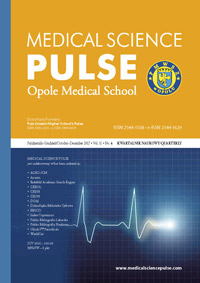Pressor amines in coronary artery bypass grafting procedure with and without the use of extracorporeal circulation
Pressor amines in coronary artery bypass grafting procedure with and without the use of extracorporeal circulation
Author(s): Anna Jurkiewicz-Śpiewak, Dariusz Szurlej, Justyna Sejboth, Piotr Gurowiec, Aleksandra Romaska, Joanna Wanot, Tomasz ŚpiewakSubject(s): Health and medicine and law
Published by: Państwowa Medyczna Wyższa Szkoła Zawodowa w Opolu
Keywords: pressor amines; cardiopulmonary bypass; off-pump coronary artery bypass procedure; coronary revascularization
Summary/Abstract: Background: Myocardial revascularization is the most commonly performed procedure in cardiac surgery. Thedevelopment of coronary artery bypass grafting techniques without the use of extracorporeal circulation leadto the modification of anaesthetic techniques. When conducting anaesthesia for the OPCA B-type of procedure,an anaesthesiologist must respond quickly, particularly to frequent and sometimes unpredictable changes tohemodynamic stability.Aim of the study: The purpose of this study was to compare the use of pressor amines among patients undergoingmyocardial revascularization with and without extracorporeal circulation.Material and methods: The study was retrospective. It included 80 patients, who underwent coronary arterybypass surgery. They were divided into two groups, and the criterion of selection was the non-application(group I – OPCA B Off-Pump Coronary Artery Bypass) or the use (group II – CPB) of extracorporeal circulation.The patients were subjected to multivariate statistical analysis in the preoperative period, which involved takingmeasures of selected clinical parameters at fixed points in time. The changes in the heart rate, mean arterialpressure and central venous pressure were also analysed. The daily balances of transfused colloid and crystalloidfluids, blood loss, given blood products and daily diuresis were compared.Results: Ephedrine was frequently administered during OPCA B procedures, but not even once in the CPB group.Dopamine was administered to all patients in the CPB group, while in the OPCA B group it was required by only25% of patients. There were no statistical differences between the two groups in the use of epinephrine in theoperating room and during the postoperative period.Conclusions: Off-pump coronary artery bypass surgery provides better haemodynamic stability and requiresadministration of smaller amounts of catecholamine.
Journal: Medical Science Pulse
- Issue Year: 11/2017
- Issue No: 4
- Page Range: 19-25
- Page Count: 7
- Language: English

